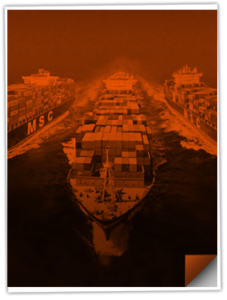Featured Headlines:
CBP Has You Fully Covered with ACE Bond Aids
Quantum Leap Goes Off the Rail
All Aboard the Innovation Express
Hitting Some Major Merger Turbulence
A Flood of Low Water Rising Costs
Sky-High Ambitions in Air Cargo
CBP Has You Fully Covered with ACE Bond Aids
- U.S. Customs and Border Protection (CBP) officials recently posted an updated development and deployment schedule for the Automated Commercial Environment (ACE) Portal to its website.
- Here are a few of the changes that importers should be aware of:
Changes Feature/Module Status Removed ACE Portal Modernization – Phase 4 Completed/deployed. Future updates to the modernized portal will be announced individually. Immediate Delivery Completed/deployed on September 30, 2023. Collections – Release 7 Completed/deployed on November 4, 2023. Entry Summary Query Updates Completed/deployed on November 4, 2023. Updated Broker Fee Automation (with additional capability highlights) Anticipated deployment date of November 29, 2023. Delay in Processing of Entry Type 86 1C Release Message in the Air Environment (with updated capability highlights) Anticipated deployment date of January 27, 2024. Added ACE Portal Modernization – Blanket Declarations Anticipated deployment date of December 9, 2023. ACE Reports Upgrade to Business Objects 4.3 Anticipated deployment date of January 24, 2024. Document Image System Email Submission Response Anticipated deployment date of March 26, 2024. Section 321 – Does not exceed $800 in Aggregated Shipments Anticipated deployment date of October 2024. - To view the full announcement, click here.
- Any questions about the ACE Portal Modernization? Feel free to reach out to our compliance experts!
A Very EXPORTant Announcement
- Earlier this month, the U.S. Department of Commerce’s Bureau of Industry and Security (BIS) announced that the Update Conference on Export Controls and Policy—originally scheduled for this week—has been moved to March 27-29, 2024.
- At this time, the conference will still be held at the Marriot Marquis Hotel in Washington.
- Any attendees and/or exhibitors that are unable to make the new dates can reach out to request a refund from the BIS directly via [email protected].
- For additional details, including a list of topics that will be covered at the event, please click here.
Lost in the Karma Initiative
- Did you know that the Canada Border Services Agency (CBSA) is implementing a new digital initiative—called the CBSA Assessment and Revenue Management (CARM)—which will change how CBSA assesses and collects duties and taxes on commercial goods imported into Canada?!
- If you ship to Canada on a DDP (delivered duty paid) basis, there will be a significant impact of CARM on your business.
- Under DDP terms, the overseas Exporter must register as a “Non-Resident Importer” in Canada. In addition to obtaining a “Business number” the “Non-Resident Importer” must now also register on the Customs CARM portal for remittance of Duty and GST.
- The “Non-Resident Importer” must also obtain surety bonds to cover their Duty and GST liabilities.
- Luckily, there’s still time to prepare for the upcoming changes! As of now, the CBSA Assessment and Revenue Management (CARM) project won’t become mandatory until May 2024.
- For additional information about this announcement, please click here.
Quantum Leap Goes Off the Rail
- Now, who said American trains can’t be punctual? BNSF Railway and J.B. Hunt have introduced Quantum Intermodal for those urgent shipments that just can’t wait.
- Quantum treats your containers like celebrities, offering priority loading, unloading, drayage, and an elegant flute of the bubbly! Plus, there’s a dedicated team in Fort Worth making sure every shipment is tracked and offering dedicated service support for issues.
- They will aim for a stellar 95% on-time rate, marrying the reliability of trucks with the efficiency of rail. It’s like having your cake and eating it too!
- Pricing is expected to be above the cost of standard intermodal service but still below the cost of using a motor-only solution.
- Shippers will play an important role in the success of the service, as communication will be vital for planning container inventories and dray capacity.
All Aboard the Innovation Express
- North American railroads are rejuvenating with new domestic, international, and cross-border services—a refreshing twist from the usual ramp-to-ramp railroading.
- After years of playing ‘hide and seek’ with lanes, railroads are now saying, “Surprise! We’re back!” and engaging more with IMCs. It’s like seeing an old friend who suddenly got way cooler.
- Railroads are creatively expanding services, with Class I railroads taking the lead in new business initiatives, aiming to regain lost ground in the intermodal market share.
- New collaborations are blooming, like CPKC teaming with Schneider for the Mexico Midwest Express, aiming to convert highway freight to rail with efficient, reliable, and (shall we say it out loud?) creative service designs.
- BNSF and J.B. Hunt’s innovative Quantum service (mentioned above) exemplifies this new trend, focusing on on-time deliveries with shared office space for better coordination and customer service.
- Railroads acknowledge service quality is key, aiming to turn skeptical shippers into fans. It’s like trying to win back an ex with promises of “We’ve changed, really…”!
Hitting Some Major Merger Turbulence
- Forward Air is pulling the emergency brake on its merger with Omni Logistics, asking a Delaware court for the big, red “STOP” button.
- The situation highlights tensions in the freight market, with Forward Air accusing Omni of not acting in good faith.
- Forward Air’s stock experienced a significant drop after the merger announcement, indicating investor skepticism.
- Ancora Alternatives is leading a shareholder revolt, calling for an overhaul of the board and leadership.
- Omni’s President JJ Schickel is standing firm, asking the court to glue the deal back together.
A Flood of Low Water Rising Costs
- The Panama Canal (PC, not that kind!) has been in the news quite a bit—and this edition is no exception! MSC has imposed a hefty $297 per TEU surcharge on shipments passing through the PC in response to the canal’s reduced capacity.
- This surcharge nearly doubles that of CMA CGM’s recently announced $150 per TEU ‘Panama Adjustment Factor,’ which starts on January 1. MSC’s surcharge kicks in earlier, from December 15.
- These limitations, coupled with increased canal tariffs, are giving MSC’s operations costs a serious case of seasickness.
- For shippers looking for evidence that the PC limitations are finally affecting the steamship business, look no further than MSC’s Santana service. MSC has announced that they will reverse directions on the US export backhaul to China, shifting their vessel returns east via the Suez! This means that the Santana will circumnavigate the globe on each voyage.
- Analysis suggests that from February, the PC’s daily capacity through the neo-Panamax locks could drop below 50% of its designed capacity while local protests over mining expansions have only exacerbated transport challenges.
- Maersk advises shippers to anticipate potential issues despite their planning to counter delays, including collaboration with the PCA for transit slots and offering limited alternative container transport options via railroad services.
- While this comment may not be “PC” about the PC, like lemmings, we expect ALL ocean carriers to implement PC fees, which will be rolled into ocean freight in the near future.
- Need to work on your “PC” skills? Shapiro’s freight experts are ready to give you the Panama Canal Crash Course of your dreams…!
Congestion Pressures Spread
- South Africa’s ports are facing severe congestion, causing shipping lines, including Maersk, to omit the country from their service loops. Currently, 96 ships are at anchor, costing the economy R98 million ($5.32 million) daily.
- Here’s the secret recipe for a Perfect Storm Congestion Cocktail:
- Mix one part of bad weather with one part of equipment issues.
- Shake well and sprinkle with a side of logistical headaches (and sharks!).
- Really, sharks in South Africa “school” the rest of the world’s fishes in ferocity and terror!
- The situation is considered more critical than last year’s October strike, with significant economic implications due to the large number of idle ships.
- Stakeholders are urged to collaborate to alleviate congestion, but a quick resolution seems unlikely. Airfreight is suggested as a partial solution, though it’s not viable for many— especially small and medium enterprises (SMEs).
- The main culprit is Transnet’s equipment maintenance issues. Real improvements are expected around February, the same time as you’d finish a marathon…on crutches. Some shipping lines are rerouting cargo via Port Louis in Mauritius to avoid South African ports.
- A long-term strategy involving industry collaboration and private-sector partnerships is underway to address equipment challenges and to modernize infrastructure.
Sky-High Ambitions in Air Cargo
- Maersk Air Cargo is initiating a trial service between the UK and China, specifically designed to accommodate the peak season demand.
- Every week, a Boeing 767-300 freighter will play hopscotch between Bournemouth Airport and Hangzhou Xiaoshan International Airport, flexing its 45-tonne muscle.
- Initially set to run until the end of the year, this service might continue beyond the peak season, depending on its success and demand.
- This additional service is part of Maersk’s broader strategy to elevate their air operations, following its earlier launch of flights from Billund, Denmark to Hangzhou, and the subsequent addition of flights from Hangzhou to Chicago Rockford.
- Follow Shapiro on LinkedIn to view our monthly Supply Chain Reaction posts, which include ocean, air, and domestic rate updates!
The Rise of Private Fleets
- U.S. shippers are channeling their inner control freaks, increasingly managing their freight with their own fleets, even though the truckload market is waving a “come hither” flag.
- Data from the Federal Motor Carrier Safety Administration (FMCSA) shows private carriage has grown steadily since 2018, with a notable boost during the COVID-19 pandemic. It’s like everyone suddenly decided to start their own trucking band.
- As of September, there’s been a nearly 19% increase in private fleets, totaling 898,932 vehicles. This includes 160,672 shipper-owned trucks, both private and for-hire.
- These private fleets now represent 44% of registered motor carriers.
- From December 2022 to September 2023, private fleets grew by 1.5%—while their for-hire counterparts took a 1.8% dip.



